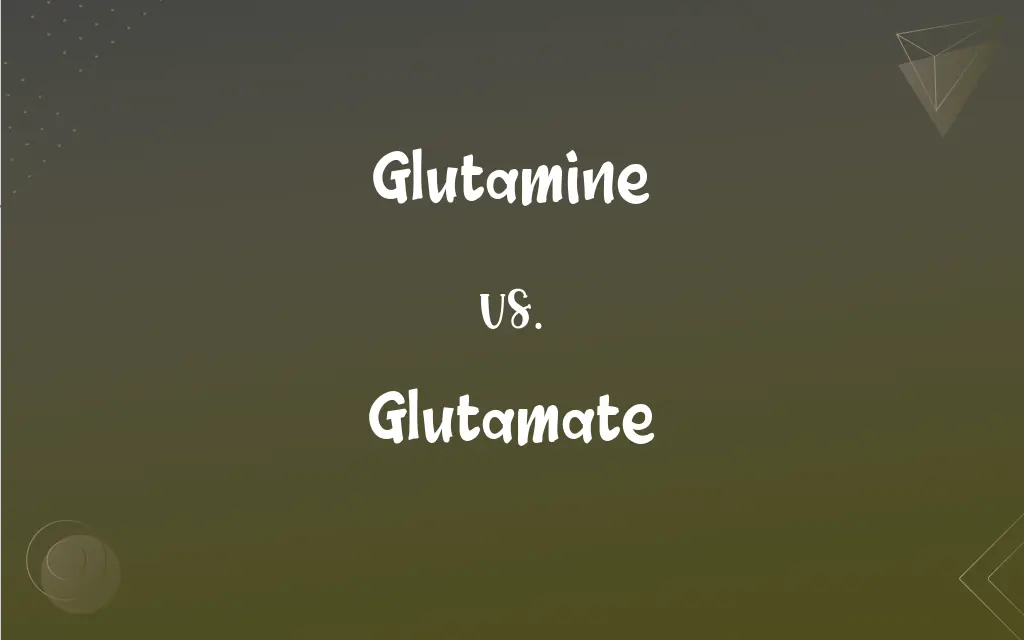Glutamine vs. Glutamate: What's the Difference?
Edited by Aimie Carlson || By Janet White || Published on December 23, 2023
Glutamine is a non-essential amino acid used in protein synthesis and immune function, while glutamate is a key neurotransmitter and a building block for protein.

Key Differences
Glutamine is an amino acid that plays a vital role in immune function and intestinal health. Glutamate, another amino acid, acts primarily as a neurotransmitter in the brain, facilitating nerve signaling.
Glutamine can be synthesized by the body and is considered non-essential, though it becomes essential in certain stress conditions. Glutamate is involved in cognitive functions like learning and memory and is critical for normal brain functioning.
Glutamine serves as a source of energy for immune cells and intestinal cells, while glutamate is crucial in metabolic processes and neurotransmission.
In the context of nutrition, glutamine is found in both animal and plant proteins and is important for muscle growth and recovery. Glutamate, on the other hand, is present in various foods and is known for its role in flavor enhancement (as in MSG - monosodium glutamate).
Glutamine is often used as a supplement for gut health and recovery after surgery or intense exercise. Glutamate's role as a neurotransmitter means it is critical in the regulation of synaptic function and nerve cell communication.
ADVERTISEMENT
Comparison Chart
Function
Supports immune and gut health, protein synthesis
Acts as a neurotransmitter, involved in learning and memory
Nature
Non-essential amino acid, conditionally essential in stress
Key neurotransmitter, essential for brain function
Dietary Sources
Found in both animal and plant proteins
Present in foods, known for enhancing flavor (as in MSG)
Role in Body
Energy source for immune and intestinal cells
Involved in metabolic processes, synaptic function
Supplement Use
Used for muscle recovery, gut health
Not typically supplemented, naturally regulated in the body
ADVERTISEMENT
Glutamine and Glutamate Definitions
Glutamine
A critical component of immune system health.
Glutamine supports the immune system, especially after strenuous activities.
Glutamate
A flavor enhancer when used in its salt form, MSG.
Monosodium glutamate (MSG) adds umami taste to foods.
Glutamine
A key amino acid in body's nitrogen balance.
Glutamine plays a role in maintaining the balance of nitrogen in the body.
Glutamate
Important for normal brain functioning.
Glutamate is essential for synaptic transmission in the brain.
Glutamine
An energy source for intestinal and immune cells.
Glutamine is essential for maintaining intestinal health.
Glutamate
A neurotransmitter involved in cognitive functions.
Glutamate's imbalance is linked to neurological disorders.
Glutamine
Involved in carbon donation and gluconeogenesis.
Glutamine contributes to the process of gluconeogenesis, the creation of glucose from non-carbohydrate sources.
Glutamate
Plays a role in the body's metabolism.
Glutamate is involved in various metabolic pathways.
Glutamine
An amino acid used in the biosynthesis of proteins.
Athletes often take glutamine supplements to aid in muscle recovery.
Glutamate
An amino acid used in protein synthesis.
Glutamate is one of the building blocks in protein molecules.
Glutamine
A nonessential amino acid, C5H10N2O3, occurring widely in plant and animal tissue and proteins and produced commercially for use in medicine and biochemical research.
Glutamate
A salt or ester of glutamic acid, especially one that functions as a neurotransmitter that excites cells of the central nervous system.
Glutamine
(amino acid) A nonessential amino acid C5H10N2O3 found in most animal and plant proteins.
Glutamate
(chemistry) Any salt or ester of glutamic acid.
Glutamine
A crystalline amino acid occurring in proteins; important in protein metabolism
Glutamate
(neuroscience) The anion of glutamic acid in its role as a neurotransmitter.
Glutamate
A salt or ester of glutamic acid
FAQs
How is glutamate important for brain health?
It acts as a key neurotransmitter, essential for learning and memory.
Can the body produce glutamine?
Yes, it is a non-essential amino acid synthesized by the body.
What foods are rich in glutamate?
Soy sauce, cheese, and tomatoes are rich in glutamate.
Does glutamate have a role in flavor?
Yes, as monosodium glutamate (MSG), it enhances the savory taste in foods.
Is glutamate safe as a food additive?
Yes, it's generally recognized as safe, but some people may have sensitivities.
What is the primary role of glutamine in the body?
It supports immune function, gut health, and protein synthesis.
Is glutamine supplementation necessary?
It is not essential for everyone but can benefit those with specific health conditions or athletes.
Are glutamine and glutamate interconvertible?
Yes, they can be converted into each other in the body.
How does glutamate affect neurotransmission?
It acts as a chemical messenger between nerve cells.
Is glutamine important for athletes?
Yes, it aids in muscle recovery and immune support.
Does glutamate naturally occur in the body?
Yes, it's naturally produced and regulated within the body.
Can glutamine improve gut health?
Yes, it's a vital energy source for cells in the intestine.
Can vegetarians get enough glutamine?
Yes, it's available in plant sources like beans and lentils.
Can glutamate cause allergies?
In rare cases, some individuals may have sensitivities to MSG.
Are there any risks associated with high glutamine intake?
Excessive intake can be harmful, especially for those with kidney or liver disease.
Is glutamate involved in learning?
Yes, it plays a critical role in learning and memory processes.
What is the difference between glutamine and L-glutamine?
L-glutamine is the biologically active form of glutamine.
Does cooking affect glutamine content in food?
Yes, prolonged cooking can reduce glutamine levels in food.
What happens with glutamate imbalance in the brain?
It can lead to neurological disorders like epilepsy or Alzheimer's.
Is glutamine beneficial for post-surgery recovery?
Yes, it can aid in recovery by supporting the immune system.
About Author
Written by
Janet WhiteJanet White has been an esteemed writer and blogger for Difference Wiki. Holding a Master's degree in Science and Medical Journalism from the prestigious Boston University, she has consistently demonstrated her expertise and passion for her field. When she's not immersed in her work, Janet relishes her time exercising, delving into a good book, and cherishing moments with friends and family.
Edited by
Aimie CarlsonAimie Carlson, holding a master's degree in English literature, is a fervent English language enthusiast. She lends her writing talents to Difference Wiki, a prominent website that specializes in comparisons, offering readers insightful analyses that both captivate and inform.































































